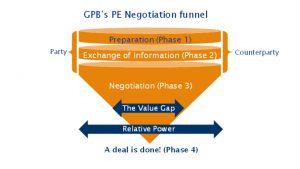Negotiators need to prepare well (phase 1) in advance of opening the dialogue (phase 2). Not everyone does…
Round 2 of the Brexit talks got under way officially on 2nd March1, with the discussions no longer about the ‘divorce’ but about the deal/s that will exist between the UK and the EU after 31st December 2020. This time things feel very different.
The posturing in the media started somewhat earlier with both sides saying, with gloves off, that they are going to be darned tough negotiators. They elaborated by sharing what their ‘Red Lines’ are, what’s impossible (already??!) and how they want the negotiation to play out. There is little that meets eye to eye so far.
Indeed, this preamble has set the scene for a classically good negotiation, which we at GPB define as the process by which parties with differences at the start, use a set of discussions and compromises to try to reach agreement. If there were no differences, there would be no need for a negotiation.
The fact that there clearly are differences means that to settle terms, one side or both will have to make concessions, usually both. We always suggest that these concessions should be of low cost to you and high value to them. But that’s not always possible, so sometimes, agreeing terms is often time-consuming, costly and painful.
Negotiations are emotional activities. They involve a lot of psychology, including the feelings about the other party, yourself and the outcome, and these can change after a deal is done if new information comes to light. “I’d have done it for less/more” can tip how you feel about a deal after it’s been done on its head.
They are also supposed to be hard work, so that the outcome is, well, somewhat satisfying. Again, that’s an emotion. You can reflect that you did ’well’ to get the deal done at all, on terms that you and your team feel was a ‘win-win’, and that it took lots of time, effort, and changes of package and people. I am though still puzzled after many years as an advisor here that both teams can ‘win’. That never happens in sport. A draw seems the nearest to that.
Brexit Round 2 feels very different from Round 1, which was about the divorce deal, along with a statement of intent for Round 2 that was non-binding. It’s controversial to take any position, but my view is that the UK planned and started Round 1 poorly, and that affected the result.
We were too meek to say we might walk away, and we asked for nothing in return when Barnier handed us his sequence for settling terms.
The UK submitted meekly to the timing, location, phases and demands of Barnier and his team. As a result the UK did not strike an acceptable deal, with the UK Parliament rejecting Theresa May’s deal three times. Just for the record that happened on 15 January, 14 March, and 29 March. It was voted down again on 22 October 2019, and the vote was finally passed under the Boris Johnson government on 20 December 2019.
If you look at our diagram below, you’ll see that we have identified four phases in a typically well-run negotiation:
- Phase 1 is the planning and preparation
- Phase 2 is the exchange of information, which is best followed by further planning and preparation
- Phase 3 is the haggling bit which usually involves the trading of concessions, and
- Phase 4 is the wrapping up of the deal that both parties think has been done.
All phases are tricky, but we find that the greatest errors are made not in the haggling, but in the preparation and exchange of information. In the 2017 negotiation, the flaws started at the very beginning with a psychologically weak position, a desire to ‘stay close to the EU’ undermining the team’s negotiation mentality. Their attempts to develop better mindsets, for example by threatening a ‘no deal Brexit’, were laughed out of town.
This time round, the posturing was both ways, which felt awkward but a lot more balanced. Whilst if anything the pressure on the UK seems greater due to the shortage of time before the (arbitrary) deadline, of 31st Dec 2020, the genuine threat of a walk-away with both sides losing out has created a much better starting point. In a sense, we would want to be starting from here.
Yes there were threats, claims of breach of commitment, challenges, threats of walk-aways, and red lines. The Relative Powers of authority, precedent, competition and time were very obvious to see.
Whilst we don’t recommend in general that our clients do public posturing, we do think Phase 1 of a negotiation should be an Exchange of Information, before the haggling starts. At least that is being done this time round. I can’t wait for the fun to start.
By Ewan Pearson

Download a PDF of the article here: And now for something completely different…

